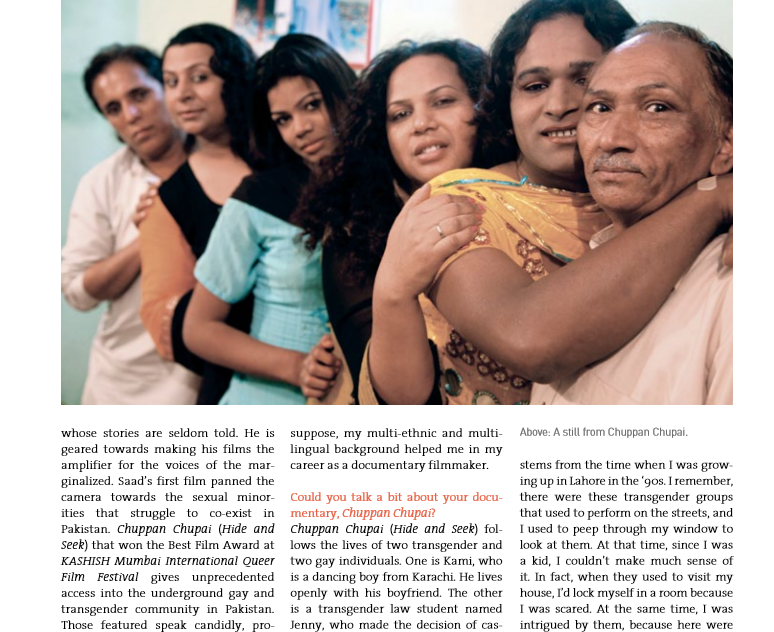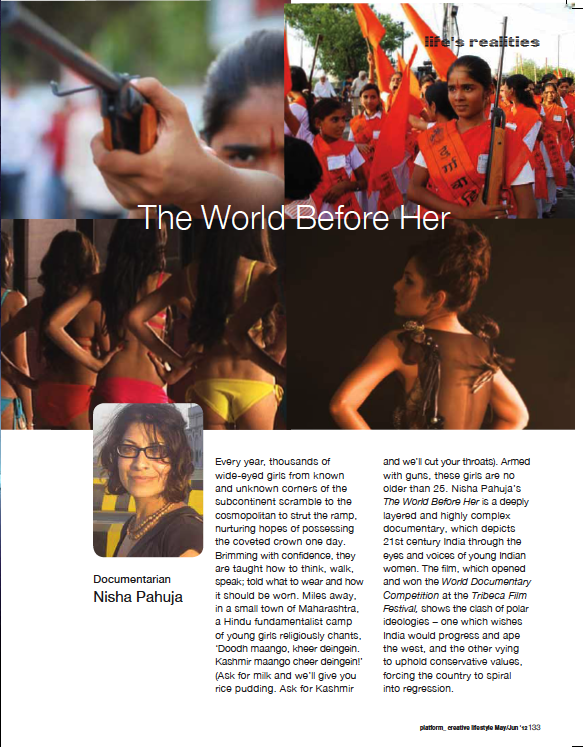Chuppan Chupai (Hide and Seek)
“Faggot. Lad Lover. Sissy. Paedo Pervert. Ass puller. Ass Stabber. Here straight people call us by many names. ‘Look at that faggot!’ That’s what they call us. We’ll never get any rights if we keep hiding our identity. How can we get out of this hide and seek?”—Kami, a cross-dresser featured in Chuppan Chupai.
A predominant section of society considers the transgender community to be peculiar, loud, flamboyant, flirtatious, and to a certain degree, intimidating. Saad Khan is an award-winning documentary filmmaker based in New York who is drawn towards documenting the lives of individuals whose stories are seldom told. He is geared towards making his films the amplifier for the voices of the marginalized. His first documentary, Chuppan Chupai (Hide and Seek) panned the camera towards the sexual minorities that struggle to co-exist in Pakistan. The documentary won the Best Film Award at KASHISH Mumbai International Queer Film Festival gives unprecedented access into the underground gay and transgender community in Pakistan. For years, the transgender community has been the center for social ridicule. Those featured in Saad’s documentary speak candidly on camera, providing an honest account of their lives and how they wear a brave face every day. Saad speaks to me about Chuppan Chupai.
Where did you grow up and when did your interest in filmmaking begin?
I was born in Lahore and I’ve lived in Islamabad as well. Growing up in Lahore, I used to enjoy mujra music on the television with my father, uncle and my brother—because we were all men and that’s what the ‘men of the family’ were supposed to do. My mother is Pashtun, while my father is a Punjabi, so they were from different ethnic backgrounds, culture and spoke different languages. I grew up learning these languages, as well as Urdu, and I suppose, my multi-ethnic and multilingual background helped me in my career as a documentary filmmaker.
Could you talk a bit about Chuppan Chupai?
Chuppan Chupai follows the lives of two transgender and two gay individuals. One is Kami, who is a dancing boy from Karachi. He lives openly with his boyfriend. The other is a transgender law student named Jenny, who made the decision of castrating himself and then regretted the transition. Then, there is Waseem who is a wedding entertainer. He was abused by his uncle, but he was also in love with him. The uncle is now married and has kids. Finally, there is Neeli who is a transgender activist who has worked towards introducing the ‘third gender law’ in Pakistan.
As a storyteller, what pushes you to direct your lens towards the underground gay and transgender community? Are you particularly drawn towards documenting those living at the fringes of society?
I’m interested in documenting groups that are marginalized. My interest in the transgender community probably stems from the time when I was growing up in Lahore in the ‘90s. I remember, there were these transgender groups that used to perform on the streets, and I used to peep through my window to look at them. At that time, since I was a kid, I couldn’t make much sense of it. In fact, when they used to visit my house, I’d lock myself in a room because I was scared. At the same time, I was intrigued by them, because here were these bunch of people who were wearing over-the-top makeup and dancing. They had a different aura about them.
I remember this one point in my life when I was peeping through my window to watch these two transgender women sitting at the curb of my neighbour’s house. They were speaking to each other and one of them asked, “Gosh, how did you get such long beautiful hair?” And the other responded, “Well, that’s because I use Papaya shampoo”— that was the first time I had heard them. I believe I had witnessed something not everyone does, because these women were speaking as ordinary individuals, and that is quite contrary to how they behave in public. In public, they would be more self-deprecating or overtly flirtatious, because it was a part of their profession. But this kind of intimate talk about using ‘Papaya shampoo’ gave me a sense of their reality. Probably such incidents led to my fascination about their lives as a kid. So I can say that my career is an extension of that curiosity. I am interested in investigating their lives. But this interest spans across all groups that are marginalized—sexual minorities, religious minorities, women at the fringes of society—their stories are important to me.
Zunn: The Showgirls of Pakistan trailer
How easy was it for you to gain access into the community and ensure that they let their guard down?
When I started the project, the story didn’t really have an arc or a three-act structure in place. I didn’t have a plan. I just like talking to people, building relationships, making connections. Also, since I speak Pushto, Punjabi and Urdu fluently, and because I understand the cultural nuances and the street vernaculars as well, it’s easy for me to connect with the people. I spend a lot of time building relationships and ensure that these relationships remain for the longest time. Therefore, because of these strong relationships, there comes a point during the filming process when people just forget that the camera is there and they begin talking to me as a friend.
The other thing is that I’m not white and I’m not someone who’s come from an alien land with an agenda—I’m one of them. I speak their language, I understand where they’re coming from and that really helps in getting the access. And I think that although filmmakers have done stories on the community before, they’ve always been represented as ‘the poor transgender people’. These films are made from a very self-righteous perspective, which is definitely not the case in our film because I don’t think I have my voice telling their stories. It’s their stories and they take it wherever they want to. It’s just that our team is helping build it together.
Could you talk about your upcoming film, Zunn: Show Girls of Pakistan? How challenging was it for you to make this film?
Zunn: Show Girls of Pakistan follows the lives of transgender show-girls who provide low-brow entertainment in Pakistan. It was shot last year and now the film is in its editing stage. During its pre-production stage, we had spent a lot of time going to the villages in Punjab and Lahore to find our characters. We finally ended up filming three women and two of their promoters who used to send these girls to Dubai to perform. Then we started an Indiegogo campaign in order to fund the making of this film. As part of the campaign, we published the trailer online. However after six days, we had to take it down because the women began receiving death threats and a lot of negative attention. So eventually, we had to stop the campaign.
While we were shooting Zunn: Show Girls of Pakistan, there was a time when we were shot at, and once we were almost robbed. In fact, there was a time when it got so intense that I called up my producer Anam Abbas. She said, “Okay, if you die today, can you please drive somewhere so that I can pick up the footage, so that at least the story is told?” So such incidents occurred a lot when we were shooting—because we were dealing with criminals! The transgender girls couldn’t talk to us directly without the consent of their promoters who were criminals. So there were times like these when I would really doubt myself and wonder, ‘What the fuck have we got ourselves into?’ However, you really have to push yourself to get the film done, because these are our people and our stories. Who else is going to tell them if we aren’t?






